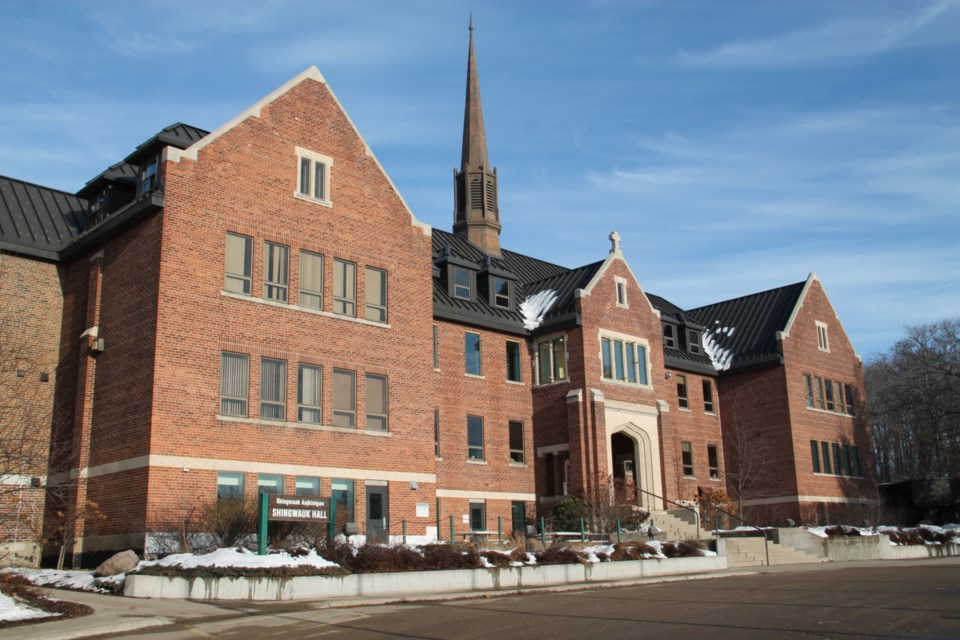A residential school survivors group in Sault Ste. Marie is “disappointed and frustrated” after a federal official denied the group access to records that could potentially help it identify four children who died at Shingwauk and Wawanosh schools more than 100 years ago.
Children of Shingwauk Alumni Association President Irene Barbeau said the group requested access to the Indian Register — a central register containing genealogical databases on First Nations people and treaty pay lists — in its effort to identify two boys and two girls who died while attending the residential schools in the early 1900s.
The group received a letter from Indian Registrar John Gordon last week denying its request to comb the register for their names, citing what Barbeau described as “privacy issues.”
“Obviously, we were disappointed and frustrated because it’s not the answer we were looking for in terms of reconciliation with Indigenous people,” said Barbeau, speaking to SooToday from Ottawa Wednesday. “These children were placed there because of an Indian policy they had during John A. MacDonald’s time as prime minister, because he thought he had an Indian problem — and that’s when they created the residential schools.
“It all came from the federal government, these policies. So, if they want to have a true reconciliation with native people, they have to be more engaging and do all they can to help us identify those [children]. It only makes sense.”
In a social media post Wednesday, former Indian Residential Schools Truth and Reconciliation Commission chairman Murray Sinclair said the federal government “appears to have no understanding of its own Privacy Act.”
Sinclair said the Privacy Act doesn’t apply to individuals who have been dead for more than 20 years.
“Arguable an applicant would have to show the person has been dead but the registrar would know that because a child's name would be so marked when the death was reported by the church which ran the school,” Sinclair said. “Churches running schools were funded based on attendance and they were obligated to report student deaths. The Privacy Act has no application in this instance.”
In his work with Children of Shingwauk Alumni Association, retired Shingwauk Residential Schools Centre researcher Ed Sadowski says he’s found little information about the four children who died while attending Shingwauk and Wawanosh Home for Girls.
He’s been trying to identify the two boys after seeing a video of the 1981 Shingwauk reunion, where former Shingwauk Residential School staff member Margaret McLean talked about two young males who had drowned in a pond near the school in either 1914 or 1915.
At that time, McLean said that her father, Shingwauk staff member Seymour Hayes, along with others tried to retrieve the two students from the pond.
The bodies of the two unidentified Shingwauk students were never recovered from the pond, which has since been filled in by the municipality and is now part of present-day Snowdon Park.
The two girls from Garden River First Nation were referenced in a 1913 Indian Affairs report, but not much else is known.
Sadowski has been attempting to confirm the identities of all four children on behalf of the survivors group through Anglican archives, the local diocese, provincial death records and Library and Archives Canada, in addition to a number of Freedom of Information Act requests to various federal ministries.
“There’s nothing there that gives us any additional information about the four kids,” Sadowski told SooToday Wednesday.
The Children of Shingwauk Alumni Association has written to both Indigenous Services Minister Patty Hajdu and Crown-Indigenous Relations Minister Marc Miller, asking them to grant the group access to search the federal records.
Barbeau said the records could also assist others in the future as searches for unmarked burials continue at residential school sites across the country.
“It’s not just for us, we’re doing it for all Indigenous people across Canada,” she said.
SooToday has reached out to Indigenous Services Canada and the Crown-Indigenous Relations department for comment.
A national residential school crisis line has been established to provide support to former students and their families. The 24-hour crisis line can be accessed at 1-866-925-4419.
